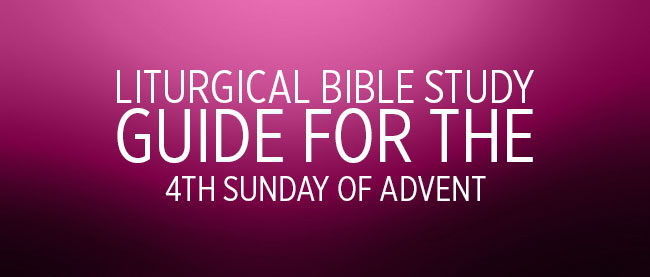Introduction
Anticipation and preparedness are the watchwords for Advent. Anticipation of the celebration of the birth of our Lord some 2000 years ago and the festivities, gifts, parties and family get-togethers which accompany that celebration. Preparedness because we are reminded that Jesus will come at the end of the world (the parousia) and all will be judged – not just on whether they believed or not, but how they have lived out their belief. Are the end times near? No one knows but the Father. We must always be ready because our personal parousia can come at any time.
1st Reading – 2 Samuel 7:1-5, 8b-12, 14a, 16
The two books of Samuel were originally one book which forms a continuation of the deuteronomic history of God’s chosen people. The book is first dominated by Samuel, the last of the Judges, who struggles to keep Israel faithful to Yahweh under increasing pressure from the Philistines. Defeats and the loss of the ark of the covenant, symbol of Yahweh’s protection, show that Israel needs a new kind of leadership – a king. Samuel anoints the first two kings, Saul and his successor, David. Saul constructs the beginnings of a stable monarchy but incurs divine displeasure and ends his rule in fits of black despondency and murderous hatred of David.
In the second book, the book from which our reading today comes, David is installed as king of Judah, and later as king of Israel as well. The twelve tribes are reunited under one leader. The reunited Israel then enjoys its most glorious period for it is, briefly, a major power in the Near East. Most important, however, is that David is the model for all kingship in Israel. He is a forceful yet attractive character, very human in his failings but passionate and intimate in his devotion to Yahweh. To him and to his line is promised endless rule, the basis of all future hope for a Messiah. This is our reading for today.
2nd Reading – Romans 16:25-27
Our second reading today is the final three verses of Saint Paul’s letter to the Romans. The letter was written to a congregation which had not been founded by Saint Paul, but was one which he anticipated visiting. The congregation is primarily composed of converted Jews and it is from the viewpoint of a former Pharisee that Saint Paul writes.
In our reading today, we find a new and different approach to the Jewish Scriptures: the great mystery of God, gradually unveiled in the course of human history, is now fully understood in the light of Jesus’ passion, death and resurrection.
Gospel – Luke 1:26-38
Saint Luke was a Syrian of Antioch. He was neither an apostle nor an eyewitness of Jesus’ earthly life. He wasn’t even a prominent figure in the apostolic Church. He was a physician and a companion or collaborator of Saint Paul. Although Saint Luke is believed to have derived his gospel (and the Acts of the Apostles) from Saint Paul, it bears little reflection of Saint Paul’s theology as reflected in his letters. This has led scholars to theorize that Saint Luke’s association with Saint Paul was early, before Saint Paul’s theology was fully developed, before Saint Paul engaged in serious letter writing, and before the Jerusalem Council (Acts 15). A more likely answer is that the gospel message is
like a brilliant jewel, and each individual approaches that jewel by viewing a different facet. The Holy Spirit has guided each of the sacred writers as they wrote, writing in terms with which they were familiar, and ensuring that each writer taught no theological error, no matter in what style he wrote.
Only two gospels contain what are known as the infancy narratives of Jesus. Today we hear the story of the Annunciation from Saint Luke’s gospel. If it sounds familiar, it is because we last heard it a couple of weeks ago on the Feast of the Immaculate Conception.


